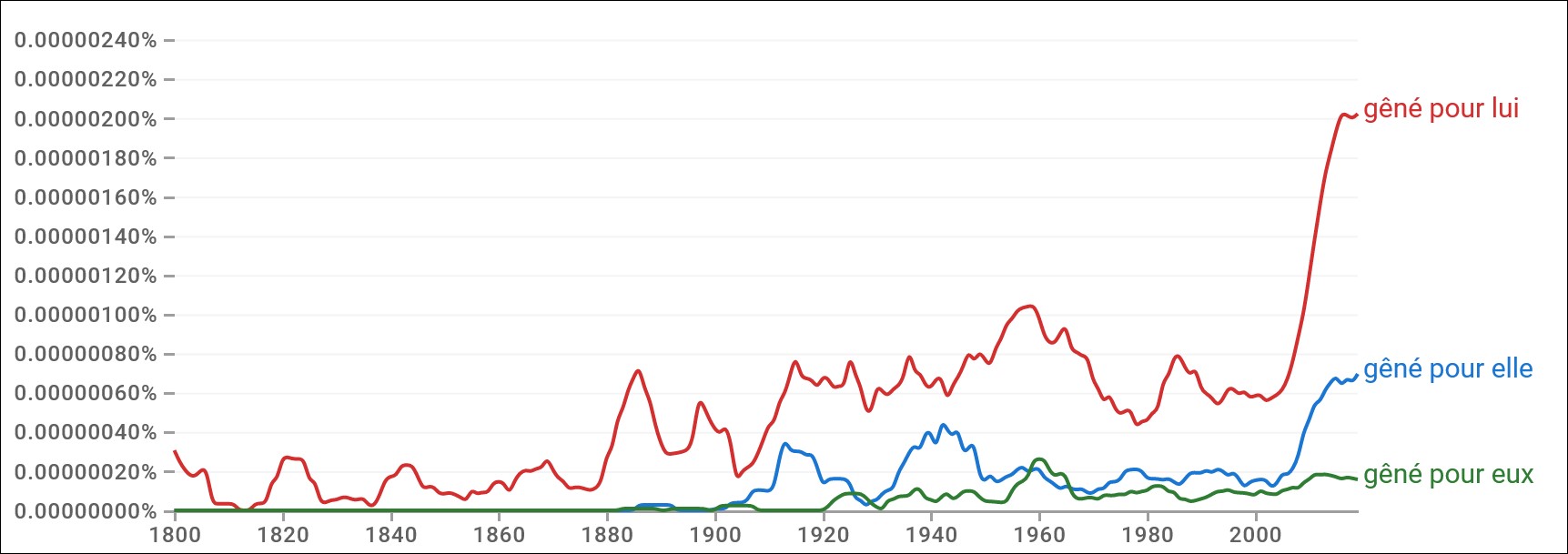This is from Gad Elmaleh's stand-up routine 'part en-live'. (I had to do a lot of work to be able to use Netflix available in France and also download the subtitles but it's possible. Why Netflix invests so much effort into prohibiting people from purchasing their product is a mystery to me). Pay attention to the last word 'gêné'
Mes amis américains m’ont emmené dans un steak house. Concept très basique : Une maison du steak. Vous voulez un steak ? Il y a une maison pour ça. Apparemment, ils font pas ça pour d’autres types de nourriture. Y’a pas d’appartement du poulet. Ou loft du poisson, peu importe. En revanche, pour la pizza, ils ont une hutte.
J’ai vu un truc très très américain là-bas : un mec, à genoux... à genoux comme ça, avec une petite boîte, devant une femme, apparemment sa fiancée, sa copine, j’espère. Il était en train de la demander en mariage. [public] Oh ! [Gad] Oh ! Non non, je suis désolé. Euh, tout le monde a réagi comme ça dans le restaurant, grosse émotion. Moi aussi, j’ai senti une grosse émotion, euh, qui s’appelle la gêne.
Personally, I think a marriage proposal in a Pizza Hut is in bad taste but o well. Anyway, 'gêné' got translated into 'embarassment' and that really threw me for a whirl since I always associate 'gêner' with 'disturbance/annoyance' not with 'embarassment'.
But according to gêne was translated 3000 times into discomfort and 900 times into embarrassment and as a past participle 'gêné' was translated 1700 times into 'embarassed' and although it was only translated 70 times into 'disturbed' this is because there are a lot of synonyms for 'disturbance' and not so many for 'embarassment'.
So 'bothered, uncomfortable, annoyed' all together make up about 900 instances - I'm not going to count the exact number. There's also a third meaning of 'hinder/impede' which we won't worry about for now.
Alright, let's get on with the question, so in English 99% of the time, in my opinion, 'x is embarrassed' is only used when 'x has done something wrong or performed badly and they have been caught red-handed or at least people are paying attention to them'. Less than 1% of the time it can be used to describe a woman who is publicly proposed to and she doesn't want such personal emotions to be on display, but, correct me if I'm wrong and you're a native speaker, I think it would be a mistake to call spectators of that event embarrassed.
Anyway, although the distinction between embarrassed/disturbed' in English is very clear-cut, the 'gêner/déranger' distinction seems less so. 'Annoyance/disturbance' in English is completely different since it has nothing to do with you being to blame for the annoyance you're feeling.
So let's get this distinction down in French, are 'gêner' and 'dérangement' pure synonyms or are there situations where you would use one and not the other? Also, in the text quoted above, was 'gêné' correctly translated into 'embarassment'? It's hard to know unless you ask Gad to go into more details, so we can just use hypotheticals. Suppose Gad was annoyed that the couple did something publicly that he felt should be kept private, would you use 'gêner' or some other word?
Suppose en revanche that the negative emotion he felt was due to the fact that another mec made a grand romantic gesture which made Gad think of the sorry state of his pathetic love-life, if that were true then I guess, yea, I might use the word 'embarrased' but would 'gêner' be the right word to express that? There is a still a third possibility, which is what I would feel, on the one hand, I'm glad that these two have found the love of their life, but on the other hand, I think it's tacky (collant, maybe?) to make a marriage proposal in such a slipshod place as pizza hut.
So I guess if I had to describe that emotion in one word it would be 'cringe-worthiness', but again, it's a very vague emotion which is very hard to state precisely. (All words related to 'cringe' appear too rarely in reverso.net so I don't how it's translated.) So once again in that third situation would 'gêné' be the right word?

